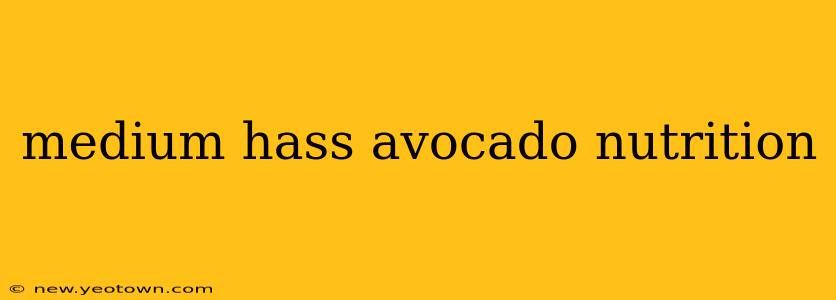The Creamy, Green Goodness of Medium Hass Avocados: A Nutritional Deep Dive
The humble avocado, particularly the popular Hass variety, has taken the world by storm. Its creamy texture and subtly nutty flavor have made it a staple in everything from guacamole to smoothies, but beyond its deliciousness lies a powerhouse of nutrients. Let's explore the nutritional profile of a medium Hass avocado and uncover why this fruit (yes, it's a fruit!) deserves its superfood status.
Imagine this: You’re slicing into a perfectly ripe Hass avocado, the deep green flesh yielding to your knife. The aroma alone is enticing, a promise of the rich, creamy goodness to come. But what exactly are you getting beyond the delicious taste?
A medium Hass avocado (about 200 grams) packs a surprisingly robust nutritional punch. Let’s break it down:
How Many Calories are in a Medium Hass Avocado?
This is a common question, and the answer is approximately 322 calories. While this might seem high for a single serving, it's important to remember that these calories are largely from healthy fats – the good kind that your body needs. These fats contribute to satiety, keeping you feeling full and satisfied for longer periods. This can be beneficial for weight management, surprisingly enough!
What are the Key Vitamins and Minerals in a Medium Hass Avocado?
Avocados are incredibly rich in vitamins and minerals, contributing significantly to a balanced diet. A medium avocado boasts:
- Vitamin K: Crucial for blood clotting and bone health.
- Folate (Vitamin B9): Essential for cell growth and development, particularly important during pregnancy.
- Vitamin C: A potent antioxidant that supports immune function.
- Potassium: An important electrolyte that helps regulate blood pressure.
- Vitamin E: Another powerful antioxidant protecting cells from damage.
- Vitamin B5 (Pantothenic Acid): Plays a role in hormone production and energy metabolism.
- Vitamin B6: Important for brain development and function.
Beyond vitamins, avocados are also good sources of minerals like magnesium, manganese, and copper.
What are the Health Benefits of Eating Avocados?
The impressive nutritional profile translates into a multitude of health benefits:
- Improved Heart Health: The monounsaturated fats in avocados help lower LDL ("bad") cholesterol levels and raise HDL ("good") cholesterol, reducing the risk of heart disease.
- Better Digestion: The fiber content promotes regular bowel movements and supports gut health.
- Eye Health Protection: The antioxidants, particularly lutein and zeaxanthin, protect against age-related macular degeneration.
- Nutrient Absorption: The healthy fats in avocados enhance the absorption of fat-soluble vitamins from other foods eaten in the same meal. Think of it as a natural nutrient booster!
- Weight Management: While caloric, the fiber and healthy fats in avocados contribute to satiety, potentially aiding in weight loss or maintenance.
Are there any downsides to eating avocados?
While generally very healthy, consuming excessive amounts of avocados can lead to weight gain due to their calorie content. Also, some individuals might be allergic to avocados. Moderation is key, as with most foods.
How to Choose and Store Ripe Avocados?
Selecting the perfect avocado is an art. Look for avocados that yield slightly to gentle pressure, indicating ripeness. Underripe avocados will be hard, while overripe ones will be mushy. To store ripe avocados, keep them in the refrigerator to slow down ripening.
The creamy green goodness of a medium Hass avocado offers a treasure trove of nutrients and potential health benefits. Incorporating this versatile fruit into your diet can contribute significantly to a healthier and more balanced lifestyle. So, the next time you're at the grocery store, pick up a few – you won't regret it!

